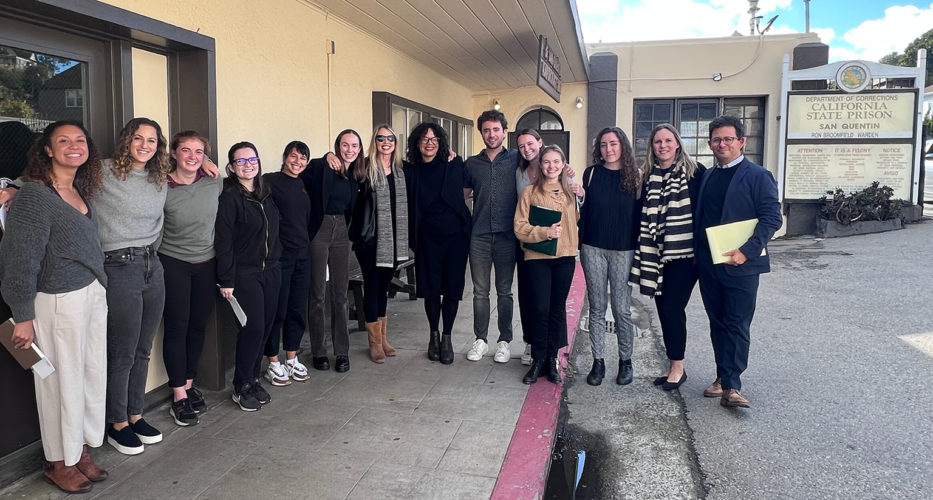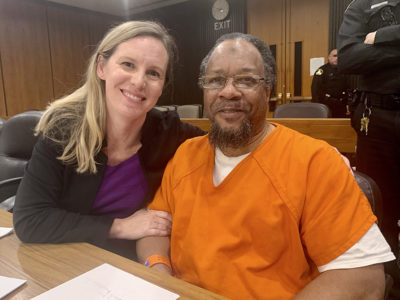Three Strikes Project Marks 10 Years of Sentencing Law Reform
After California’s now infamous “Three Strikes and You’re Out” law passed in 1994, it did not take long for the startling stories to emerge: people sent to prison for life for stealing a pair of shoes, possessing a tiny amount of drugs, or breaking into a soup kitchen for food.

By 2006, as the state’s prisons continued to fill up and the disproportionate sentences started attracting national media attention, Michael Romano, JD ’03, decided it was time to act. He founded what became known as the Three Strikes Project, the first law school program of its type in the country, focused on securing reduced sentences for incarcerated people deemed to be serving disproportionate sentences. As the project’s director for the past 16 years, he has helped Stanford Law students win the release of more than 200 Californians imprisoned under the state’s Three Strikes law.
A pivotal moment for the project came in 2010, when criminal law expert David Mills, professor of the practice of law, approached Romano with a bold proposal. Rather than fight one-off habeas corpus battles on behalf of individuals serving disproportionate sentences, why not try to change the law responsible for those sentences?
So they did.
In November 2022, the project celebrated the 10th anniversary of the passage of the Three Strikes Reform Act, or Proposition 36, a landmark legislative effort led from start to finish by Stanford Law students and project staff members in partnership with the NAACP Legal Defense Fund.
Proposition 36 significantly modified California’s sentencing law, the country’s toughest when it was enacted nearly 20 years ago. Among other mitigating provisions of Proposition 36, life sentences in the state are mandated only if the third felony conviction is “serious or violent,” or if the perpetrator of a third felony was previously convicted of murder, rape, or sexual assault on a child.
“Stanford Law students took the lead on it all, from researching how to get a measure on the ballot, to drafting the statutory language, to assisting on the campaign and engaging in public outreach on the merits of the proposition,” Romano says. “It was extraordinary. This may have been the first legislative reform effort since the Civil War, and possibly in United States history, that succeeded in changing criminal sentences retroactively.”
But changing the law was just half the battle.

As soon as the law took effect, three to four thousand people serving life sentences in California automatically became eligible for release. “We developed a game plan with public defenders’ offices throughout the state for how to represent all these people,” Romano says. “Ten years later, we are still fighting the fight. We receive hundreds of letters from inmates every week, boxes and boxes, asking for help.”
According to data from the Three Strikes Project, 3,419 people have been freed from life sentences under Proposition 36—almost one person per day for a decade.
Now, with most of the eligible prisoners having been released, the Three Strikes Project is focused on securing release for other prisoners, using other provisions of the law and the U.S. Constitution.
“We’re not talking about release for serial rapists and murderers,” Mills explains. “Many of the people we support are suffering from homelessness or drug addiction. They are disproportionately from underrepresented communities. All of them have committed nonviolent crimes but have been punished at levels previously reserved for much more egregious actions. What Proposition 36 has done, and what the project focuses on every day, is to address the compelling problem of over-incarceration and disproportionate sentences.”
Emily Galvin Almanza, JD ’10, was a student member of the Three Strikes Project in the years leading up to Proposition 36. She returned to the project as a staff attorney in 2012 and was one of the first lawyers in California to bring post-Proposition 36 petitions for relief under the state’s Three Strikes law. “The data is irrefutable that these long sentences do not serve as a deterrent and are only a cost to society,” says Galvin Almanza, co-founder and executive director of Partners for Justice, a nonprofit providing support services to people facing criminal charges and tools to public defenders for reducing incarceration.
“When I was litigating these cases prior to Proposition 36, it was uniformly horrific and heartbreaking,” she continues. “There was no real mechanism for securing justice in cases like one I had, where my client was sentenced to life for stealing $30 of plumbing supplies to fix a leak in his family’s home. To come back to the Three Strikes Project and to be able to utilize a new law—one drafted by the project—to secure justice in these egregious situations was just remarkable. I felt it encapsulated what the law is for. We rarely see systems acknowledge their own failures, but here we have exactly that.”
Current project student Madison Villarreal, JD ’24, says, “The way society paints all people sentenced under the Three Strikes law as violent and dangerous is so far from reality. I wish everyone had the privilege to meet with our clients.”
Praised as “a voice for the forsaken” by The Economist, the project has evolved since its launch and is now a class that enrolls approximately 20 law students per year.
According to data provided by the project, more than 1,000 prisoners were released in the first eight months of enactment of Proposition 36. From this group, the recidivism rate stands at less than 2 percent, a number well below state and national averages. The project claims Proposition 36 has saved California taxpayers between $10 and $13 million to date.
Project student Leanna Lupin Inserni, JD ’23, says she is grateful for what the project has accomplished and looks forward to additional reforms. “What doors have opened? How do we go back for the people that were left out of Proposition 36?” SL
